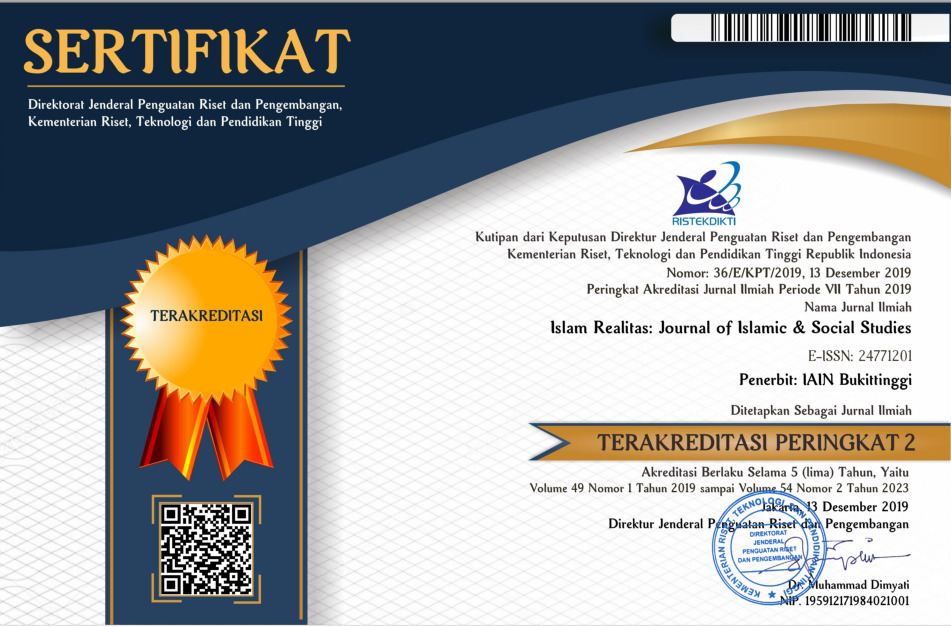The Relationship between Agents and Structures in Changing the Authority of Halal Certificates in Indonesia
DOI:
https://doi.org/10.30983/fuaduna.v7i1.6165Keywords:
Law No. 33 of 2014, Indonesian Ulama Council (MUI), Halal Product Assurance Agency (BPJPH), Agent, StructureAbstract
References
Ahmad, B. (2020). Analisis Respon Pelaku Usaha Minuman Kopi (Coffee Shop) terhadap Kewajiban Sertifikasi Halal. Jurnal Ekonomika Dan Bisnis Islam, 3(2), 165–174. https://doi.org/10.26740/jekobi.v3n2.p165-174
Akim, A., Konety, N., Purnama, C., & Korina, L. C. (2019). The Shifting of Halal Certification System in Indonesia: From Society-Centric To State-Centric. MIMBAR: Jurnal Sosial Dan Pembangunan, 35(1), 115–126. https://doi.org/10.29313/mimbar.v35i1.4223
Alqubra, Z. (2017). Persepsi Pemilik Warung terhadap Sertifikasi Halal di Kota Parepare. STAIN Parepare.
Aminullah, A. (2018). Kandungan Total Lipid Lemak Ayam dan Babi Berdasarkan Perbedaan Jenis Metode Ekstraksi Lemak. JURNAL AGROINDUSTRI HALAL, 4(1), 094–100. https://doi.org/10.30997/jah.v4i1.949
Azizah, F. (2019). Relasi Agen-Struktur Dalam Implementasi Program Corporate Social Responsibility (CSR). Universitas Airlangga.
Comte, A. (1893). The Positive Philosophy (3rd ed.). Kegan Paul, Trench, Trübner & Company.
Creswell, J. W. (2017). Research Design: Qualitative, Quantitative, and Mixed Methods Approaches (4th ed.). Sage publications.
Faridah, H. D. (2019). Halal Certification in Indonesia: History, Development, and Implementation. Journal of Halal Product and Research, 2(2), 68. https://doi.org/10.20473/jhpr.vol.2-issue.2.68-78
Giddens, A. (1984). The Constitution of Society: Outline of the Theory of Structuration. University of California Press.
Giddens, A. (2009). Problematika Utama dalam Teori Sosial: Aksi, Struktur, Kontradiksi Dalam Analisis Sosial. Pustaka Pelajar.
Giddens, A. (2010). Teori Strukturasi: Dasar-Dasar Pembentukan Struktur Sosial Masyarakat. Pustaka Pelajar.
Herry-Priyono, B. (2003). Anthony Giddens: Suatu Pengantar. Kepustakaan Populer Gramedia.
Kamsari, A. (2019). Mekanisme Pengajuan Sertifikasi Halal dan Fasilitasi Halal Bagi UMK. http://www.halal.go.id/cms/, 2019, http://www.halal.go.id/cms/assets/files/Materi_Pak_Amru_compressed.pdf.
Kodir, A. (2014). Relasi Sosial dalam Implementasi Perda No. 4 Tahun 2011 Jawa Timur (Analisis Teori Strukturasi Mengenai Relasi Sosial Agen – Struktur Dalam Implementasi Peraturan Daerah Tentang Tanggung Jawab Sosial Perusahaan (TSP) Di Jawa Timur). Universitas Airlangga.
Kompasiana. (2017). Badan Penyelenggara Jaminan Produk Halal (BPJPH) Diresmikan Kementerian Agama Sebagai Badan Sertifikasi Halal. Kompasiana.Com.
Kuba, Q. S., & Humeira, B. (2021). Relasi Agen Dan Struktur dalam Konstruksi Isu Disabilitas di Media Online. JSJ: Jurnal Studi Jurnalistik, 3(1), 22–34. https://doi.org/http://doi.org/10.15408/jsj.v3i1.
Kusnah, S. A. (2016). Polarisasi Penduduk Lokal dalam Pembangunan di Desa Panglungan Dusun Mendiro Kecamatan Wonosalam Kabupaten Jombang [UIN Sunan Ampel Surabaya]. http://digilib.uinsby.ac.id/5930/
MUI. (2018). Sejarah MUI. Majelis Ulama Indonesia. https://mui.or.id/sejarah-mui
Nuruzzaman, R. (2017). Relasi Agen Dan Struktur Pada Perubahan Sistem Kerja (Studi Kasus Sistem Absensi Elektronik Fingerprint Pada Dinas Pendidikan Provinsi DKI Jakarta). UIN Syarif Hidayatullah Jakarta.
Octavianto, A. W. (2014). Strukturasi Giddens dan Social Construction of Technology (SCoT) Sebagai Pisau Analisis Alternatif Penelitian Sosial Atas Teknologi Media Baru. Jurnal ULTIMA Comm, 6(2), 41–57. https://doi.org/10.31937/ultimacomm.v6i2.417
Odekon, M. (2015). The SAGE Encyclopedia of World Poverty. Sage publications.
Praditya, R. (2020). Atta Halilintar: Agen Strukturisasi Karir Generasi-Z. Jurnal Ilmu Komunikasi, 6(2). https://doi.org/https://doi.org/10.30656/lontar.v8i2
Puspitidsari, D., & Ruwaida, I. (2021). Relasi Sosial Agen-Struktur Dalam Gerakan Koalisi Masyarakat Sipil Anti Kekerasan Seksual Pendukung Pengesahan RUU-PKS. Jurnal Sains Sosio Humaniora, 5(1), 665–681.
Rahardjo, S. (2000). Ilmu Hukum. Citra Aditya Bakti.
Rahayu, Sultarini, S., & Angriani, R. (2019). Relasi Sosial Agen-Struktur Dalam Gerakan Koalisi Masyarakat Sipil Anti Kekerasan Seksual Pendukung Pengesahan RUU-PKS. Jurnal Publikasi, 1(1). https://doi.org/https://doi.org/10.22437/jssh.v5i1.15289
Report, S. of G. I. E. (2020). State of Global Islamic Economic Report 2020-2021: Thriving in Uncertainty.
Salim, A. (2001). Teori Dan Paradigma Penelitian Sosial: Buku Sumber Untuk Penelitian Kualitatif. Tiara Wacana.
Sayekti, N. W. (2014). Jaminan Produk Halal dalam Perspektif Kelembagaan. Jurnal Ekonomi & Kebijakan Publik, 5(2), 193–209. https://doi.org/http://dx.doi.org/10.22212/jekp.v5i2.84
Sidiq, H. B. (2022). Sertifikasi Halal Kementerian Agama Memunculkan Polemik. Kumparan. https://kumparan.com/helmi-baharuddin-sidiq/sertifikasi-halal-kementerian-agama-memunculkan-polemik-1xmoBB4MOA4.
Simamora, A. R., Hamid, A., & Hkmawan, M. D. (2019). Diskriminasi Terhadap Kelompok Minoritas Jemaat Ahmadiyah Indonesia (JAI) di Tangerang Selatan. International Journal of Demos, 1(1), 19–37. https://doi.org/https://doi.org/10.37950/ijd.v1i1.4
Suminar, P. (2020). Relasi Agen dan Struktur: Ruang Negosiasi dalam Pengelolaan Sumberdaya Hutan di Kabupaten Lebong. Jurnal Sosiologi Nusantara, 6(1), 55–76. https://doi.org/10.33369/jsn.6.1.55-76
Suparto, S., D, D., Yuanitasari, D., & Suwandono, A. (2016). Harmonisasi Dan Sinkronisasi Pengaturan Kelembagaan Sertifikasi Halal Terkait Perlindungan Konsumen Muslim Indonesia. Mimbar Hukum - Fakultas Hukum Universitas Gadjah Mada, 28(3), 427. https://doi.org/10.22146/jmh.16674
Suriyani, M. (2019). Pergeseran Kewenangan MUI dalam Memberikan Jaminan Produk Halal Pasca Lahirnya Undang-Undang Nomor 33 Tahun 2014. Jurnal Hukum Samudra Keadilan, 14(1), 25–44. https://doi.org/10.33059/jhsk.v14i1.914
Wirdyaningsih, Karimah, I., Syahida, A. Q., & Nabilah, A. M. (2020). The Optimization of Halal Certification in Indonesia: Finding Right Balance between Consumer and Businessmen Interest. Proceedings of the 2nd International Conference of Law, Government and Social Justice (ICOLGAS 2020). https://doi.org/10.2991/assehr.k.201209.319
Yu, L. (2019). Towards Structure–Agency Integrative Theories for Information Access Disparity. Journal of Documentation, 75(3), 458–477. https://doi.org/10.1108/JD-09-2018-0149
Downloads
Published
How to Cite
Issue
Section
Citation Check
License
Copyright (c) 2023 Munir Azhari and Roma Ulinnuha

This work is licensed under a Creative Commons Attribution-ShareAlike 4.0 International License.
Authors who publish with this journal agree to the following terms:
- Authors retain copyright and grant the journal right of first publication with the work simultaneously licensed under a Creative Commons Attribution-ShareAlike 4.0. that allows others to share the work with an acknowledgment of the work's authorship and initial publication in this journal.
- Authors are able to enter into separate, additional contractual arrangements for the non-exclusive distribution of the journal's published version of the work (e.g., post it to an institutional repository or publish it in a book), with an acknowledgment of its initial publication in this journal.
- Authors are permitted and encouraged to post their work online (e.g., in institutional repositories or on their website) prior to and during the submission process, as it can lead to productive exchanges, as well as earlier and greater citation of published work (See The Effect of Open Access).





